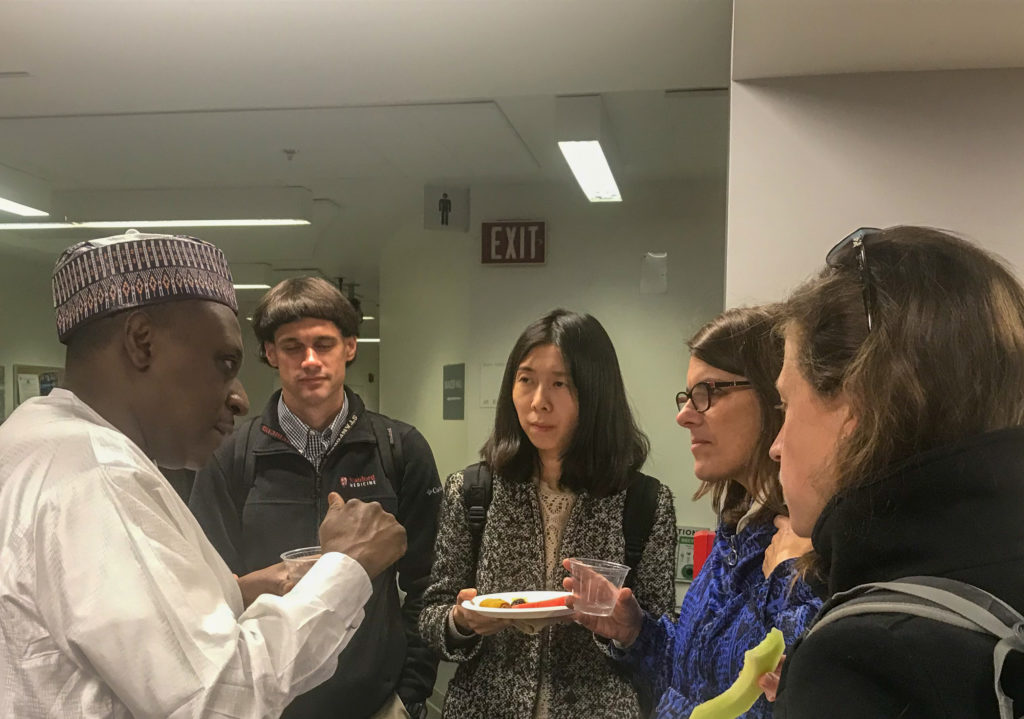Published: 02/02/2020
When Muhammad Ali Pate became Nigeria’s Minister of Health ten years ago, he set an ambitious goal of saving one million lives in the West African nation. Last year, Pate became the Global Director for Health, Nutrition and Population at the World Bank, and Director of the Global Financing Facility, where he is pursuing even more ambitious goals while continuing to build communities of trust.
“In global health, it’s about trust and it’s important to have the humility to say, ‘There are things we know and things that others may know,’” said Pate, who is from a nomadic pastoralist background and holds a trio of academic degrees—an MD, an MBA, and a Masters in Health System Management.
“He’s an incredibly humble man considering all he has accomplished,” said Dr. Michele Barry, Stanford’s Director of the Center for Innovation in Global Health. “In two days on campus, he met with our faculty fellows to learn about the work they do around the world and offered reflections. And in meetings with students and residents, he shared stories and offered advice that will help shape their careers.”

As part of an ongoing series of Conversations in Global Health, Pate was interviewed by Paul Costello, Senior Communications Strategist for the School of Medicine. Before an audience of more than 100 students, faculty, friends and visiting scholars, Pate talked about his childhood and the importance of education.
Pate’s father was a nomadic pastoralist Fulani. “He was exposed to western education and it changed his life and the lives of his children and grandchildren,” Pate said, adding that he chose to study medicine out of a desire to make other people’s lives better.
When Pate became the Minister of Health for Nigeria, he knew that the appointment would not last forever so he tried to hit the ground running. To set priorities, he reviewed the data on public health and called his team together to gather input on projects and ways to engage stakeholders to save at least one million lives from dying due to preventable causes. By the end of his public service that target was apparently achieved through vaccinations and other primary health services to the population.
“We need to make sure various voices are brought to the table as policy is being made,” Pate said. “We need those who would be excluded to be factored into the decisions.”
Inclusivity remains important in his current role as well. While visiting Stanford, Pate met with leaders of Silicon Valley companies. “Technology could change health systems in the future,” he said, “it could empower the patient and help us understand the preferences of patients. I see digital health and AI as promising technologies but they come with issues of governance. It’s important to ask, ‘who are we leaving behind?’”
When talking about the current state of health on the African continent, Pate pointed to a series of positive trends. Child and infant mortality rates are going down; vaccination rates are going up; the spread of HIV has slowed; and access to health care has increased. There are still great challenges and Pate, for one, is optimistic.
“To be in this business, it’d be very tough to be a pessimist,” he said. “Every day, I look and think it can be better. Tomorrow will be better than today.”
Conversations in Global Health are sponsored by the Center for Innovation in Global Health. For the next conversation, on Feb. 12, Costello will interview Dr. Joanne Liu, past international president of Médecins Sans Frontières (Doctors Without Borders) and a woman considered one of the 100 most influential people in the world by Time magazine.